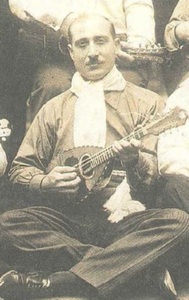Nikos Ordoulidis, Athens: Tatavlian/New York: Beykos, 2017.
Thessaloniki, ‘Variations, Processing, Transformations’. Annual Conference of The Greek Musicological Society (1-2 December 2017).
On 7 May in 1935 in New York, six songs are recorded with Spyros Peristeris as the protagonist. Spyros is the son of Aristidis and the upholder of the tradition of the Smyrnean estudiantina, known as ‘The Politakia’. One of the songs is labelled Beykos and on the Orthophonic record label the key-words ‘hasapiko’, ‘Politakia’, ‘Dimitriadis’, ‘Peristeris’, ‘mandolin’ are printed. The piece is performed in quick tempo, with the mandolin and the piano, following the renowned condition of Asia Minor polystylism.
One year earlier, Spyros Peristeris records the same tune in Athens, titled Tatavlian hasapiko. This first recording by Odeon leans towards the aesthetic context of the Piraean rebetiko, and is implemented with instrumental minimalism; two guitars, at half the speed/tempo of that of the Beyko. Whether it be ‘beyko’ or ‘hasapiko’, in New York or in Athens, the same music melody is subject to aesthetic transformations, sketching the style of the Greek-speaking urban popular musicians of the previous century, not as an overlapping trend with set boundaries (Smyrnean, rebetiko, Piraean rebetiko), but as an utterly intertextual field. On the one hand certain particular aesthetical characteristics are recognized in this field, however, their nature is totally fluid, since they function in constant transfiguration. The multiplicity of their actualization is therefore imperative as a methodological starting point of their study.


